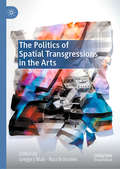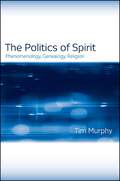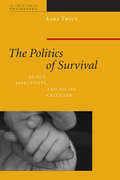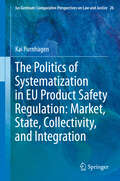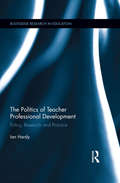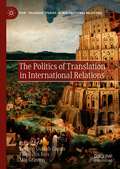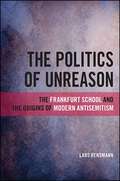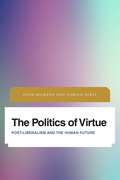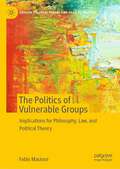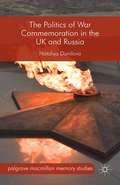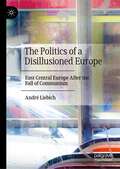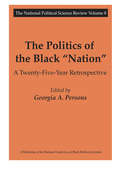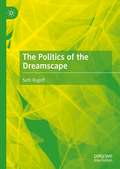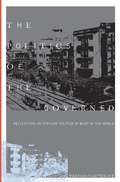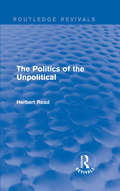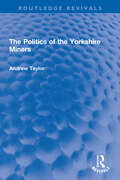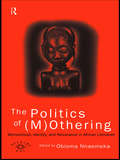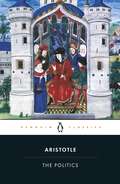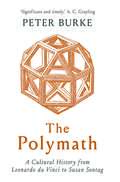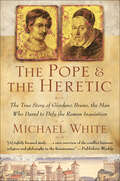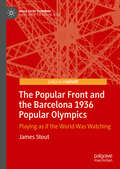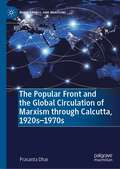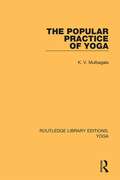- Table View
- List View
The Politics of Spatial Transgressions in the Arts
by Gregory Blair Noa BronsteinThis book is an anthology of the varied strategies of spatial transgressions and how they have been implemented through the arts as a means to resist, rejuvenate, reclaim, critique or cohabitate. The book is divided into two sections – Displacements and Disruptions. The first section discusses the ramifications of the spatial displacements of bodies, organizations, groups of people and ethnicities, and explores how artists, theorists and arts organizations have an attentive history of revealing and reacting to the displacement of peoples and how their presence or absence radically reconfigures the value, identity, and uses of place. In the second section, each author considers how aesthetic strategies have been utilized to disrupt expected spatial experiences and logic. Many of these strategies form radical alternative methodologies that include transgressions, geographies of resistance, and psychogeographies. These spatial performances of disruption set into motion a critical exchange between the subject, space and materiality, in which ideology and experience are both produced/spatialized and deconstructed/destabilized.
The Politics of Species
by Raymond Corbey Annette LanjouwThe assumption that humans are cognitively and morally superior to other animals is fundamental to social democracies and legal systems worldwide. It legitimises treating members of other animal species as inferior to humans. The last few decades have seen a growing awareness of this issue, as evidence continues to show that individuals of many other species have rich mental, emotional and social lives. Bringing together leading experts from a range of disciplines, this volume identifies the key barriers to a definition of moral respect that includes nonhuman animals. It sets out to increase concern, empathy and inclusiveness by developing strategies that can be used to protect other animals from exploitation in the wild and from suffering in captivity. The chapters link scientific data with normative and philosophical reflections, offering unique insight into controversial issues around the ethical, political and legal status of other species.
The Politics of Spirit: Phenomenology, Genealogy, Religion (SUNY series, Issues in the Study of Religion)
by Tim MurphyA penetrating critique of the dominant approach to the study of religion, The Politics of Spirit explores the historical and philosophical scaffolding of the phenomenology of religion. Although this approach purports to give a value-free, neutral description of religious data, it actually imposes a set of metaphysical and evaluative concepts on that data. A very harmful ethnocentrism has resulted, which plagues the academic study of religion to this day. Analysis of the history, core texts, and discursive structure of phenomenology of religion reveals how this ethnocentrism is embedded within its assumptions. Of particular interest is the revelation of the extent to which Hegel's ideas—over those of Husserl—contributed to the tenets that became standard in the study of religion.Tim Murphy argues that the poststructuralist concept of genealogy, as derived from Nietzsche, can both describe religion better than the phenomenological approach and avoid the political pitfalls of ethnocentrism by replacing its core categories with the categories of difference, contingency, and otherness. Ultimately, Murphy argues that postmodern genealogy should replace phenomenology as the paradigm for understanding both religion and the study of religion.
The Politics of Survival: Peirce, Affectivity, and Social Criticism (American Philosophy)
by Lara TroutHow can sincere, well-meaning people unintentionally perpetuate discrimination based on race, sex, sexuality, or other socio-political factors? To address this question, Lara Trout engages a neglected dimension of Charles S. Peirce's philosophy - human embodiment - in order to highlight the compatibility between Peirce's ideas and contemporary work in social criticism. This compatibility, which has been neglected in both Peircean and social criticism scholarship, emerges when the body is fore-grounded among the affective dimensions of Peirce's philosophy (including feeling, emotion, belief, doubt, instinct, and habit). Trout explains unintentional discrimination by situating Peircean affectivity within a post-Darwinian context, using the work of contemporary neuroscientist Antonio Damasio to facilitate this contextual move. Since children are vulnerable, naïve, and dependent upon their caretakers for survival, they must trust their caretaker's testimony about reality. This dependency, coupled with societal norms that reinforce historically dominant perspectives (such as being heterosexual, male, middle-class, and/or white), fosters the internalization of discriminatory habits that function non-consciously in adulthood. The Politics of Survival brings Peirce and social criticism into conversation. On the one hand, Peircean cognition, epistemology, phenomenology, and metaphysics dovetail with social critical insights into the inter-relationships among body and mind, emotion and reason, self and society. Moreover, Peirce's epistemological ideal of an infinitely inclusive community of inquiry into knowledge and reality implies a repudiation of exclusionary prejudice. On the other hand, work in feminism and race theory illustrates how the application of Peirce's infinitely inclusive communal ideal can be undermined by non-conscious habits of exclusion internalized in childhood by members belonging to historically dominant groups, such as the economically privileged, heterosexuals, men, and whites. Trout offers a Peircean response to this application problem that both acknowledges the "blind spots" of non-conscious discrimination and recommends a communally situated network of remedies including agapic love, critical common-sensism, scientific method, and self-control.
The Politics of Systematization in EU Product Safety Regulation: Market, State, Collectivity, and Integration
by Kai PurnhagenThis book examines the increasing role of the legal method of systematisation in European Union (EU) law. It argues that the legal method of systematisation that has been developed in a welfare-state context is increasingly used as a regulative tool to functionally integrate the market. The book uses the example of EU product regulation as a reference to illustrate the impact of systematisation on EU law. It draws conclusions from this phenomenon and redefines the current place and origin of systematisation in the EU legal system. It puts forward and demonstrates two main arguments. First, in certain sectors such as in EU product safety law, the quality of EU law changes from a sector-specific and reactive field of law to an increasingly coherent legal system at European level. Therefore, instead of punctual market intervention, it increasingly governs whole market areas. By doing so, it challenges and often fully replaces the respective welfare-based legal systems in the Member States for the benefit of the ideal of a market-driven EU legal system. Second, at European level, the ideal is in development. This illustrates the change of the function of Statecraft from nation-states to market-states.
The Politics of Teacher Professional Development: Policy, Research and Practice (Routledge Research in Education #80)
by Ian HardyThe Politics of Teacher Professional Development: Policy, Research and Practice provides innovative insights into teachers’ continuing development and learning in contemporary western contexts. Rather than providing a list of "how-tos" and "must dos," this volume is premised on the understanding that by learning more about the current conditions under which teachers and other educators work and learn, it is possible to understand, and consequently improve, the learning opportunities teachers experience. Teacher professional development is not simply construed as an isolated series of events, such as day-long workshops marking the beginning of each school year or term, or individualistic "one-off" activities focused on new teaching approaches, curricula or assessment strategies. Rather, through application of sociologist Pierre Bourdieu’s understanding of social practices as contested, teacher professional development is revealed as a complex social practice which exists as policy, as a research product and process, and as an important part of teachers’ work. The book reveals how PD as policy, research and teachers’ work are inherently contested. An extended series of case studies of teacher professional development practices from Canada, England and Australia are employed to show how these tensions play out in complex ways in policy and practice.
The Politics of Technological Progress: Parties, Time Horizons and Long-term Economic Development
by Joel W. Simmons"Why are some countries richer than others and why do some economies grow more rapidly? The Politics of Technological Progress answers these vital questions by highlighting the importance of technological progress for sustained economic development. The author also explains why some countries exhibit faster technological progress than others. Armed with a wealth of cross-national empirical evidence, Professor Simmons stresses the importance of properly constructed political parties for establishing an environment conducive to technological progress. 'Well-institutionalized' ruling parties are essential for technological progress, he argues, because only in such parties are time horizons long enough for governments to accept the deferred returns that are an inherent feature of government efforts to encourage innovation and technology adoption in the economy"--
The Politics of Translation in International Relations (Palgrave Studies in International Relations)
by Zeynep Gulsah Capan Filipe Dos Reis Maj GrastenThis volume concerns the role and nature of translation in global politics. Through the establishment of trade routes, the encounter with the ‘New World’, and the circulation of concepts and norms across global space, meaning making and social connections have unfolded through practices of translating. While translation is core to international relations it has been relatively neglected in the discipline of International Relations. The Politics of Translation in International Relations remedies this neglect to suggest an understanding of translation that transcends language to encompass a broad range of recurrent social and political practices. The volume provides a wide variety of case studies, including financial regulation, gender training programs, and grassroot movements. Contributors situate the politics of translation in the theoretical and methodological landscape of International Relations, encompassing feminist theory, de- and post-colonial theory, hermeneutics, post-structuralism, critical constructivism, semiotics, conceptual history, actor-network theory and translation studies. The Politics of Translation in International Relations furthers and intensifies a cross-disciplinary dialogue on how translation makes international relations.
The Politics of Unreason: The Frankfurt School and the Origins of Modern Antisemitism (SUNY series, Philosophy and Race)
by Lars RensmannAlthough the Frankfurt School represents one of the most influential intellectual traditions of the twentieth century, its multifaceted work on modern antisemitism has so far largely been neglected. The Politics of Unreason fills this gap, providing the first systematic study of the Frankfurt School's philosophical, psychological, political, and social research and theorizing on the problem of antisemitism. Examining the full range of these critical theorists' contributions, from major studies and prominent essays to seemingly marginal pieces and aphorisms, Lars Rensmann reconstructs how the Frankfurt School, faced with the catastrophe of the genocide against the European Jews, explains forms and causes of anti-Jewish politics of hate. The book also pays special attention to research on coded and "secondary" antisemitism after the Holocaust, and how resentments are politically mobilized under conditions of democracy. By revisiting and rereading the Frankfurt School's original work, this book challenges several misperceptions about critical theory's research, making the case that it provides an important source to better understand the social origins and politics of antisemitism, racism, and hate speech in the modern world.
The Politics of Virtue: Post-Liberalism and the Human Future
by John Milbank Adrian PabstContemporary politics is dominated by a liberal creed that champions negative liberty and individual happiness. This creed undergirds positions on both the right and the left free-market capitalism, state bureaucracy and individualism in social life. The triumph of liberalism has had the effect of subordinating human association and the common good to narrow self-interest and short-term utility. By contrast, post-liberalism promotes individual fulfillment and mutual flourishing based on shared goals that have more substantive content than the formal abstractions of liberal law and contract, and yet are also adaptable to different cultural and local traditions. In this important book, John Milbank and Adrian Pabst apply this analysis to the economy, politics, culture, and international affairs. In each case, having diagnosed the crisis of liberalism, they propose post-liberal alternatives, notably new concepts and fresh policy ideas. They demonstrate that, amid the current crisis, post-liberalism is a program that could define a new politics of virtue and the common good.
The Politics of Vulnerable Groups: Implications for Philosophy, Law, and Political Theory (Critical Political Theory and Radical Practice)
by Fabio MacioceThis book describes and analyzes the conceptual ambiguity of vulnerability, in an effort to understand its particular applications for legal and political protection when relating to groups. Group vulnerability has become a common concept within legal and political scholarship but remains largely undertheorized as a phenomenon itself. At the same time, in academia and within legal circles, vulnerability is primarily understood as a phenomenon affecting individuals, and the attempts to identify vulnerable groups are discredited as essentialist and stereotypical. In contrast, this book demonstrates that a conception of group vulnerability is not only theoretically possible, but also politically and legally necessary. Two conceptions of group vulnerability are discussed: one focuses on systemic violence or oppression directed toward several individuals, while another requires a common positioning of individuals within a given context that conditions their agency, ability to cope with risks and uncertainties, and manage their consequences. By comparing these two definitions of group vulnerability and their implications, Macioce seeks a more precise delineation of the theoretical boundaries of the concept of group vulnerability.
The Politics of War Commemoration in the UK and Russia (Palgrave Macmillan Memory Studies)
by Nataliya DanilovaThis book analyses contemporary war commemoration in Britain and Russia. Focusing on the political aspects of remembrance, it explores the instrumentalisation of memory for managing civil-military relations and garnering public support for conflicts. It explains the nexus between remembrance, militarisation and nationalism in modern societies.
The Politics of a Disillusioned Europe: East Central Europe After the Fall of Communism
by André LiebichMoving from the fall of the Berlin Wall in 1989 to the present day, this book traces the trajectory of the six East Central European former satellites of the Soviet Union (Poland, Hungary, the Czech Republic, Slovakia, Romania, Bulgaria) that have joined the European Union. It seeks in particular to explain these countries’ disenchantment with the “return to Europe” in spite of their significant advances. The book proceeds country by country and then devotes chapters to some contemporary issues, such as minorities, migration, and the relations of these “new” members with the European Union as a whole. The book eschews theory and is intended for a general audience, including students at all levels in political science and history classes devoted to the EU and to contemporary Europe, and to an academic and practitioner audience interested in world affairs and the evolution of the European Union. The book strives to fill a persistent knowledge gap in the English-speaking world concerning East Central Europe, and to offer fresh insights about the region in the context of contemporary geopolitics.
The Politics of the Black Nation: A Twenty-five-year Retrospective (National Political Science Review Ser.)
by Georgia A. PersonsThis volume of the National Political Science Review, the official publication of the National Political Science Association, is anchored by a major symposium on The Politics of the Black "Nation," the book authored by Matthew Holden in 1973, which is now considered one of the most influential books in the field of black politics. Twenty-five years provide a sufficient timespan on which to base a retrospective of the book and simultaneously to reflect upon the evolution of the black liberation struggle, more formally called, African American politics. In the present age, there is not much talk about "a black nation," certainly not as was heard during the 1960s and mid-1970s. Yet there is a persistent sense of separateness in that there is constant thought and talk of "Black America" as a significantly separate communal entity. Black Americans are seen as a racially and culturally distinct community holding to social, political, economic interests which have special significance and poignancy for them. Holden's perception of the nature of the times in the early seventies stands in sharp contrast to how contemporary analysts of African American politics tend to perceive the nature of African Americans' role in political life and their position in American society in the present age. In this retrospective, readers have the opportunity to get a sense of what Holden argued of the seven essays that make up his seminal volume and to consider how well Holden's observations have stood the tests of time. In addition to the essays presented at the symposium, which pointedly discuss Holden's work, there are essays dealing with "African American Politics in Constancy and Change," by contributors including Charles Henry, David Covin, Robert C. Smith, Clyde Lusane, Cheryl Miller, D'Linell Finley, and Sekou Franklin, among others. Other features are a highly informative discussion of the Literary Digest magazine's Straw-Vote Presidential Polls, 1916-1936, and a
The Politics of the Dreamscape
by Seth RogoffThis book traces the intersection of dreams and power in order to analyze the complex ways representations of dreams and paradigms of dream interpretation reinforce and challenge authoritarian, hierarchical structures. The book puts forward the concept of the dreamscape as a pre-representational space that contains anarchistic attributes, including its instability or chaotic nature and the lack of a stable or core selfhood and identity in its subjects. The book situates this concept of the dreamscape through an analysis of the Daoist notions of the “transformation of things” and hundun (chaos) and the biblical concept of tehom (the deep). Using this conceptual framework, this book analyzes paradigmatic moments of dream interpretation along a spectrum from radical, anarchist assertions of the primal dreamscape to authoritarian dream-texts that seek to reify identity, define and establish hierarchy, and support coercive relationships between unequal subjects. The book’s key figures include William Blake, Robert Frost, Jacob and Joseph from Genesis, Sigmund Freud, Carl Jung, Jean Rhys, Franz Kafka, and the neurobiologist J. Allan Hobson
The Politics of the Governed: Reflections on Popular Politics in Most of the World (Leonard Hastings Schoff Lectures)
by Partha ChatterjeeOften dismissed as the rumblings of "the street," popular politics is where political modernity is being formed today, according to Partha Chatterjee. The rise of mass politics all over the world in the twentieth century led to the development of new techniques of governing population groups. On the one hand, the idea of popular sovereignty has gained wide acceptance. On the other hand, the proliferation of security and welfare technologies has created modern governmental bodies that administer populations, but do not provide citizens with an arena for democratic deliberation. Under these conditions, democracy is no longer government of, by, and for the people. Rather, it has become a world of power whose startling dimensions and unwritten rules of engagement Chatterjee provocatively lays bare.This book argues that the rise of ethnic or identity politics—particularly in the postcolonial world—is a consequence of new techniques of governmental administration. Using contemporary examples from India, the book examines the different forms taken by the politics of the governed. Many of these operate outside of the traditionally defined arena of civil society and the formal legal institutions of the state. This book considers the global conditions within which such local forms of popular politics have appeared and shows us how both community and global society have been transformed. Chatterjee's analysis explores the strategic as well as the ethical dimensions of the new democratic politics of rights, claims, and entitlements of population groups and permits a new understanding of the dynamics of world politics both before and after the events of September 11, 2001.The Politics of the Governed consists of three essays, originally given as the Leonard Hastings Schoff Lectures at Columbia University in November 2001, and four additional essays that complement and extend the analyses presented there. By combining these essays between the covers of a single volume, Chatterjee has given us a major and urgent work that provides a full perspective on the possibilities and limits of democracy in the postcolonial world.
The Politics of the Unpolitical (Routledge Revivals: Herbert Read and Selected Works)
by Herbert ReadIn this collection of fourteen essays, first published in 1943, Herbert Read extends and amplifies the points of view expressed in his successful pamphlet To Hell with Culture, which has been reprinted here. The ‘politics of the unpolitical’ are the politics of those who strive for human values and not for national or sectional interests. Herbert Read defines these values and demands their recognition as a solvent of social and cultural crises’, and looks forward to the future with constructive vision. This book will be of interest to students of politics, history, and philosophy.
The Politics of the Yorkshire Miners (Routledge Revivals)
by Andrew TaylorFirst published in 1984, The Politics of the Yorkshire Miners examines all aspects of political activity of the Yorkshire Area of the NUM. The book was written using original research from the archives of the Yorkshire Area combined with the author’s personal experience. It explores developments from 1945 onwards, and looks at internal politics within the Area, discussing the nature of policies on both industrial bargaining and wider political aims. It considers the role of sponsored MPs and their relationship to the Area, as well as the NUM’s ‘special relationship’ with the Labour Party. The structure of the Area and its role within the NUM nationally are also discussed, and detailed analysis is given to the strikes of 1972 and 1974.
The Politics of: Womanhood, Identity and Resistance in African Literature (Opening Out: Feminism for Today)
by Obioma NnaemekaThis collection is a study of African literature framed by the central, and multi-faceted, idea of 'mother' - motherland, mothertongue, motherwit, motherhood, mothering - looking at the paradoxical location of (m)other as both central and marginal. Whilst the volume stands as a sustained feminist analysis, it engages feminist theory itself by showing how issues in feminism are, in African literature, recast in different and complex ways.
The Politics: Introduction To The Politics
by AristotleTwenty-three centuries after its compilation, 'The Politics' still has much to contribute to this central question of political science. Aristotle's thorough and carefully argued analysis is based on a study of over 150 city constitutions, covering a huge range of political issues in order to establish which types of constitution are best - both ideally and in particular circumstances - and how they may be maintained. Aristotle's opinions form an essential background to the thinking of philosophers such as Thomas Aquinas, Machiavelli and Jean Bodin and both his premises and arguments raise questions that are as relevant to modern society as they were to the ancient world.
The Polymath: A Cultural History from Leonardo da Vinci to Susan Sontag
by Peter BurkeThe first history of the western polymath, from the fifteenth century to the present day From Leonardo Da Vinci to John Dee and Comenius, from George Eliot to Oliver Sacks and Susan Sontag, polymaths have moved the frontiers of knowledge in countless ways. But history can be unkind to scholars with such encyclopaedic interests. All too often these individuals are remembered for just one part of their valuable achievements. In this engaging, erudite account, renowned cultural historian Peter Burke argues for a more rounded view. Identifying 500 western polymaths, Burke explores their wide-ranging successes and shows how their rise matched a rapid growth of knowledge in the age of the invention of printing, the discovery of the New World and the Scientific Revolution. It is only more recently that the further acceleration of knowledge has led to increased specialisation and to an environment that is less supportive of wide-ranging scholars and scientists. Spanning the Renaissance to the present day, Burke changes our understanding of this remarkable intellectual species.
The Pope & the Heretic: The True Story of Giordano Bruno, the Man Who Dared to Defy the Roman Inquisition
by Michael WhiteThe story of the trial of visionary philosopher Giordano Bruno. “A nice overview of the conflict between religion and philosophy in the Renaissance.” —Publishers WeeklyGiordano Bruno challenged everything in his pursuit of an all-embracing system of thought. This not only brought him patronage from powerful figures of the day but also put him in direct conflict with the Catholic Church. Arrested by the Inquisition and tried as a heretic, Bruno was imprisoned, tortured, and, after eight years, burned at the stake in 1600. The Vatican “regrets” the burning yet refuses to clear him of heresy.But Bruno’s philosophy spread: Galileo, Isaac Newton, Christiaan Huygens, and Gottfried Leibniz all built upon his ideas; his thought experiments predate the work of such twentieth-century luminaries as Karl Popper; his religious thinking inspired such radicals as Baruch Spinoza; and his work on the art of memory had a profound effect on William Shakespeare.Chronicling a genius whose musings helped bring about the modern world, Michael White pieces together the final years—the capture, trial, and the threat the Catholic Church felt—that made Bruno a martyr of free thought.“White’s book is exemplary for its discussions of the period’s intellectual beliefs and social structure and for its vivid detail and illuminating look at Bruno’s trial and subsequent death.” —Library Journal“Riveting.” —Birmingham Post
The Popular Front and the Barcelona 1936 Popular Olympics: Playing as if the World Was Watching (Mega Event Planning)
by James StoutThis book deals with the events leading up to the 1936 Popular Olympics which would have united the Popular Front in opposition to the Berlin Olympics. It also discusses the days after the outbreak of the Spanish Civil War which began on the same day the games were due to start. Using a variety of primary and secondary sources, the book traces the biographies of several Popular Olympians who would go on to volunteer in the Spanish Civil War. The book also examines the planned events and locations for the Popular Olympics as well as the international funding that the games secured. The book argues that the events were a departure from Workers’ Sport as well as the IOC’s Olympic games and represented an important cultural manifestation of the Popular Front.
The Popular Front and the Global Circulation of Marxism through Calcutta, 1920s-1970s (Marx, Engels, and Marxisms)
by Prasanta DharThis book examines the global circulation of Marxism seen from one of its most highly charged sites: Calcutta in India. Building on but also revising existing approaches to global intellectual history, the book presents the circulation of Marxism through Calcutta as a historically-sited problem of mass mediation. Using tools from media studies, the book explores the way that Marxism was presented to the public, the technologies used, and the meanings of Marxism in twentieth-century Calcutta. Demonstrating how the Popular Front was split between the so-called 'people's group' and those whom were called 'intellectuals', the book argues that the people's group generally identified themselves as Marxists and preferred audio-visual media such as theatre, while the so-called intellectuals privileged academic rigour and print media, usually referring to themselves as Marxians. Thus, the author reveals a polyphony of Marxisms in the Popular Front. Tracing Marxism back to the Bengal Renaissance and the Swadeshi and Naxal movements, this book shows how debate around the meaning of 'Marxism' continued throughout the 1970s in Calcutta, and eventually engendered the historiographical movement that has come to be known as Subaltern Studies.
The Popular Practice of Yoga (Routledge Library Editions: Yoga #6)
by K.V. MulbagalaThis book, first published in 1935, is an early western study of the practice of yoga. It examines the theories of yoga, and attempts to understand and explain its philosophy and beliefs.
